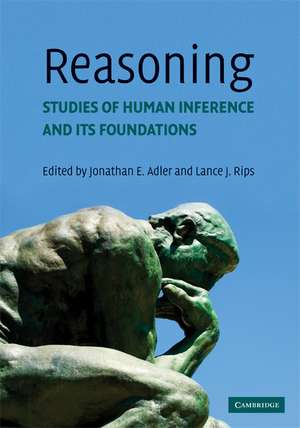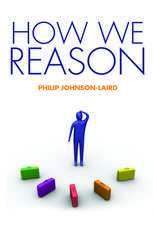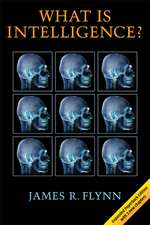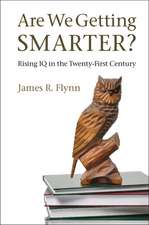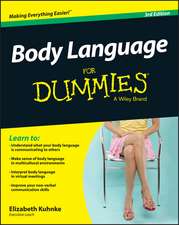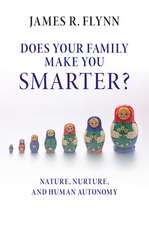Reasoning: Studies of Human Inference and its Foundations
Editat de Jonathan E. Adler, Lance J. Ripsen Limba Engleză Paperback – 4 mai 2008
| Toate formatele și edițiile | Preț | Express |
|---|---|---|
| Paperback (1) | 576.37 lei 6-8 săpt. | |
| Cambridge University Press – 4 mai 2008 | 576.37 lei 6-8 săpt. | |
| Hardback (1) | 735.40 lei 6-8 săpt. | |
| Cambridge University Press – 11 mai 2008 | 735.40 lei 6-8 săpt. |
Preț: 576.37 lei
Preț vechi: 647.60 lei
-11% Nou
Puncte Express: 865
Preț estimativ în valută:
110.32€ • 119.88$ • 92.73£
110.32€ • 119.88$ • 92.73£
Carte tipărită la comandă
Livrare economică 21 aprilie-05 mai
Preluare comenzi: 021 569.72.76
Specificații
ISBN-13: 9780521612746
ISBN-10: 0521612748
Pagini: 1072
Dimensiuni: 177 x 254 x 45 mm
Greutate: 1.84 kg
Ediția:1
Editura: Cambridge University Press
Colecția Cambridge University Press
Locul publicării:New York, United States
ISBN-10: 0521612748
Pagini: 1072
Dimensiuni: 177 x 254 x 45 mm
Greutate: 1.84 kg
Ediția:1
Editura: Cambridge University Press
Colecția Cambridge University Press
Locul publicării:New York, United States
Cuprins
Preface; List of contributors; Introduction: philosophical foundations; Part I. Foundations of Reasoning: Section 1. Some Philosophical Viewpoints: 1. Change in view: principles of reasoning; 2. Belief and the will; 3. Internal and external reasons; 4. Paradoxes; Section 2. Fallacies and Rationality: 5. When rationality fails; 6. Extensional versus intuitive reasoning: the conjunction fallacy in probability judgment; 7. Can human irrationality be experimentally demonstrated?; 8. Breakdown of will; Part II. Modes of Reasoning: Section 3. Deductive Reasoning: 9. Logical approaches to human deductive reasoning; 10. Mental modes and deductive reasoning; 11. Interpretation, representation, and deductive reasoning; 12. Reasoning with quantifiers; 13. The problem of deduction; Section 4. Induction: 14. Patterns, rules, and inferences; 15. Inductive logic and inductive reasoning; 16. Reasoning in conceptual spaces; 17. Category-based induction; 18. When explanations compete: the role of explanatory coherence on judgments of likelihood; 19. Properties of inductive reasoning; Section 5. Dual and Integrative Approaches: 20. Human reasoning and argumentation: the probabalistic approach; 21. Individual differences in reasoning and the algorithmic/intentional level distinction in cognitive science; 22. Reasoning, decision making, and rationality; Section 6. Abduction and Belief Change: 23. Defeasible reasoning; 24. Explanatory coherence; 25. Belief revision; 26. Belief, doubt, and evidentialism; 27. Reflections on conscious reflection: mechanisms of impairment by reasons analysis; 28. Belief change as propositional update; Section 7. Causal and Counterfactual Reasoning: 29. Causal thinking; 30. Causation; 31. Propensities and counterfactuals: the loser that almost won; Section 8. Argumentation: 32. The layout of arguments; 33. The skills of argument; 34. Reasoning and conversation; Part III. Interactions of Reasoning in Human Thought: Section 9. Reasoning and Pragmatics: 35. Specificationism; 36. Presupposition, attention, and why-questions; 37. Further notes on logic and conversation; 38. The social context of reasoning: conversational inference and rational judgment; Section 10. Domain-Specific, Goal-Based, and Evolutionary Approaches: 39. Domain-specific knowledge and conceptual change; 40. Pragmatic reasoning schemas; 41. Beyond intuition and instinct blindness: toward an evolutionarily rigorous cognitive science; 42. Use or misuse of the selection task? Rejoinder to Fiddick, Cosmides, and Tooby; 43. Why we are so good at catching cheaters; 44. The modularity of mind: an essay on faculty psychology; 45. Commitment Brian Skyrms; 46. Evolution of inference; Section 11. Reasoning across Cultures: 47. Reasoning across cultures; 48. Culture and systems of thought: holistic versus analytic cognition; 49. On the very idea of a conceptual scheme; 50. The truth in relativism; Section 12. Biology, Emotions, and Reasoning: 51. Logic and biology: emotional inference and emotions in reasoning; 52. Distinct brain loci in deductive versus probabilistic reasoning; 53. The emotional dog and its rational tail: a social intuitionist approach to moral judgment; Index.
Recenzii
"This book provides a very comprehensive, almost encyclopedic overview in the general area of reasoning. It encompasses psychological research and philosophical considerations of inductive paradoxes, along with useful sections on argumentation, reasoning and cultures, emotions and reasoning, abduction, and belief change. [...] Readers would benefit from a background in introductory logic or a familiarity with the history and practice of formal reasoning, especially for those articles in which formalization predominates over natural language. [...], this worthwhile book will benefit a wide range of readers since most of the articles deal with problems and issues that are fundamental to understanding the various ways that reasoning works, can work in context, or could work to inform prescriptions in ethics or arguments addressed to the best explanations. Recommended."
--J. Gough, Red Deer College, CHOICE
--J. Gough, Red Deer College, CHOICE
Descriere
An interdisciplinary collection of major essays on reasoning by a well-known group of philosophers, psychologists and cognitive scientists.
